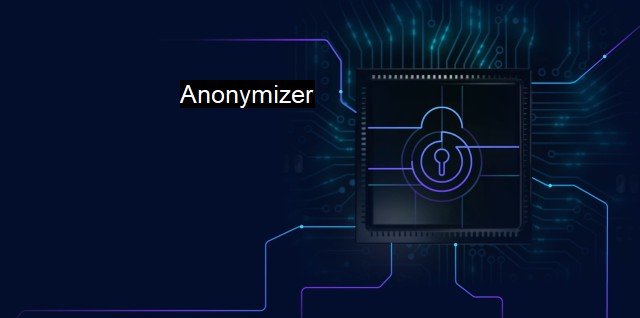What is Anonymizer?
The Vital Role of Anonymizers in Protecting Internet Privacy and Security: Exploring Types and Techniques to Combat Sophisticated Cyber Threats
An anonymizer is a tool or software that serves to maintain your privacy on the internet by obscuring your data and personal information. Originating from the term 'anonymous,' anonymizers act similarly to the concept of anonymity; they enable internet users to visit websites or send messages without revealing who they are or where they come from. anonymizers play a critical role in protecting against potential threats from hackers and online criminals.The central premise of an anonymizer revolves around the user's IP address, which is a unique numerical label given to each device connected to a network that uses Internet Protocol as a medium for communication. Every time one sends a request to access specific information or website on the internet, their IP address identifies who they are and where they are keyword. Anonymizers cloud that IP address, making the request seem like it comes from a completely different user or location.
Anonymizers work in various ways depending on the type. One type is a proxy anonymizer. These proxies sit between the user's computer and the internet, receiving requests from the user, forwarding them to the web, and then sending the results back to the user. By doing so, the proxy can remove or replace the user's IP address with its own, making the user anonymous on the internet.
Another type is the Virtual Private Network (VPN), which allows users to create a secure connection to another network over the internet. People use VPNs to access region-restricted websites by masking (or making their IP address seem as if it belongs to) a different geographical location. Anonymizers use VPN’s unique technologies to offer the same result: data and identity protection.
Tor (The Onion Router) anonymizers use a different method. They direct internet traffic through volunteer networks around the world, each stage of which adds more layers of encryption. The result is that the destination site can't even tell where the data came from or communicate directly with the original sender, ensuring complete anonymity.
Anonymizers are invaluable resources for users. They shield them from threats that might compromise their security and data privacy. malicious cybercriminals can also exploit the potential benefits of anonymous web surfing. They may use anonymizers to carry out their activities without detection.
For antivirus technologies, whenever these softwares detect the user is transmitting data via an insecure environment, one way they can prevent unauthorized access and protect against threats is by integrating with privacy tools or even adopting anonymizing methods, like using VPNs or internet traffic tunneling to mask users’ activities and protect the data from unwanted exposure.
Be it organizations or individual users, anonymizers are advantageous; they ensure anonymity, offer freedom from censorship, and help bypass geographical constraints on the web. users also need to be aware of potential detriments, such as reduced network speed due to heavy data encryption and potential misuse for illegal or unethical activities.
Importantly, not all anonymizers offer the same degree of protection. Some only remove or replace information that could directly identify users, while others take additional measures, such as encrypting data, blocking third-party tracking technologies, or changing the appearance of the transmitted data to baffle any watchers.
To sum up, anonymizers are privacy tools that keep a user's data and identity safe when surfing the web. They manipulate the user's IP address and disguise it as if it belongs to someone or somewhere else. Despite their benefits, users need to judiciously choose suitable anonymizers, based on their needs for privacy and security, while also considering the set of unique challenges and threats they may pose in terms of cybersecurity and antivirus.

Anonymizer FAQs
What is an anonymizer?
An anonymizer is a tool or service that enables users to browse the internet or use online services with their true identity hidden. It masks the user's IP address and other identifying information, making it difficult for third parties to trace their online activity.How does an anonymizer work?
An anonymizer works by routing a user's internet connection through a proxy server or VPN server before connecting to the desired website or service. The proxy or VPN server then masks the user's IP address with its own, making it appear that the internet traffic is originating from the proxy or VPN server rather than the user's device.What are the benefits of using an anonymizer?
Using an anonymizer provides several benefits, including increased online privacy and security, protection against cyber threats and attacks, and the ability to bypass internet censorship and content restrictions. It can also help users avoid targeted advertising and prevent their personal information from being collected and shared with third parties.Is using an anonymizer legal?
In most countries, using an anonymizer is legal as long as it is not being used for illegal activities. However, some countries have restrictions on the use of anonymizers, and some online services may prohibit the use of anonymizers. It is important to check the laws and terms of service in your location before using an anonymizer.| | A | | | B | | | C | | | D | | | E | | | F | | | G | | | H | | | I | | | J | | | K | | | L | | | M | |
| | N | | | O | | | P | | | Q | | | R | | | S | | | T | | | U | | | V | | | W | | | X | | | Y | | | Z | |
| | 1 | | | 2 | | | 3 | | | 4 | | | 7 | | | 8 | | |||||||